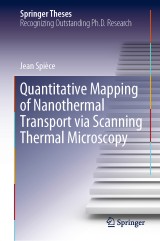Details

Quantitative Mapping of Nanothermal Transport via Scanning Thermal Microscopy
Springer Theses
|
CHF 118.00 |
|
| Verlag: | Springer |
| Format: | |
| Veröffentl.: | 18.10.2019 |
| ISBN/EAN: | 9783030308131 |
| Sprache: | englisch |
Dieses eBook enthält ein Wasserzeichen.
Beschreibungen
<p>The thesis tackles one of the most difficult problems of modern nanoscale science and technology - exploring what governs thermal phenomena at the nanoscale, how to measure the temperatures in devices just a few atoms across, and how to manage heat transport on these length scales. Nanoscale heat generated in microprocessor components of only a few tens of nanometres across cannot be effectively fed away, thus stalling the famous Moore's law of increasing computer speed, valid now for more than a decade. In this thesis, Jean Spièce develops a novel comprehensive experimental and analytical framework for high precision measurement of heat flows at the nanoscale using advanced scanning thermal microscopy (SThM) operating in ambient and vacuum environment, and reports the world’s first operation of cryogenic SThM. He applies the methodology described in the thesis to novel carbon-nanotube-based effective heat conductors, uncovers new phenomena of thermal transport in two- dimensional (2D) materials such as graphene and boron nitride, thereby discovering an entirely new paradigm of thermoelectric cooling and energy production using geometrical modification of 2D materials.</p>
Outline and motivations.- Background Review.- SThM Experimental Models and Setups for Exploring Nanoscale Heat Transport.- Quantitative Thermal Transport Measurements in Nanostructures.- Three Dimensional Mapping of Thermal Properties.- Nanoscale Thermal Transport in Low Dimensional Materials.- Thermoelectric Phenomena in Graphene Constrictions.- Conclusion and Perspectives.- Appendices.<p></p><p></p>
After graduating from the Université Libre de Bruxelles in both Ethics and Physics, Jean Spièce was one of the research brains in the major European project 'Quantiheat' through which he obtained his PhD at Lancaster University. The aim of this European project was to tackle the challenge of quantitative nanoscale thermal transport measurements. Beyond this topic, Jean Spièce's research interests are primarily materials nanoscale properties with a focus on thermal and thermoelectrical scanning probe microscopy applications. After finishing at Lancaster University, he took a position in the consulting industry where he strives to find impactful solutions for innovative partners.
<p>The thesis tackles one of the most difficult problems of modern nanoscale science and technology - exploring what governs thermal phenomena at the nanoscale, how to measure the temperatures in devices just a few atoms across, and how to manage heat transport on these length scales. Nanoscale heat generated in microprocessor components of only a few tens of nanometres across cannot be effectively fed away, thus stalling the famous Moore's law of increasing computer speed, valid now for more than a decade. In this thesis, Jean Spièce develops a novel comprehensive experimental and analytical framework for high precision measurement of heat flows at the nanoscale using advanced scanning thermal microscopy (SThM) operating in ambient and vacuum environment, and reports the world’s first operation of cryogenic SThM. He applies the methodology described in the thesis to novel carbon-nanotube-based effective heat conductors, uncovers new phenomena of thermal transport in two- dimensional (2D) materials such as graphene and boron nitride, thereby discovering an entirely new paradigm of thermoelectric cooling and energy production using geometrical modification of 2D materials.</p>
Nominated as an outstanding Ph.D. thesis by the Lancaster University, Lancaster, England Includes multiple images and diagrams helping to understand and visualize the research Presents a unique approach of Scanning Thermal Microscopy to study thermoelectric properties of 2D materials Offers an analytical framework backed up with experimental data, enabling quantitative nanoscale thermal transport measurements
Diese Produkte könnten Sie auch interessieren:

Introduction to Focused Ion Beams

von: Lucille A. Giannuzzi, Lucille A. North Carolina State University

CHF 153.50















